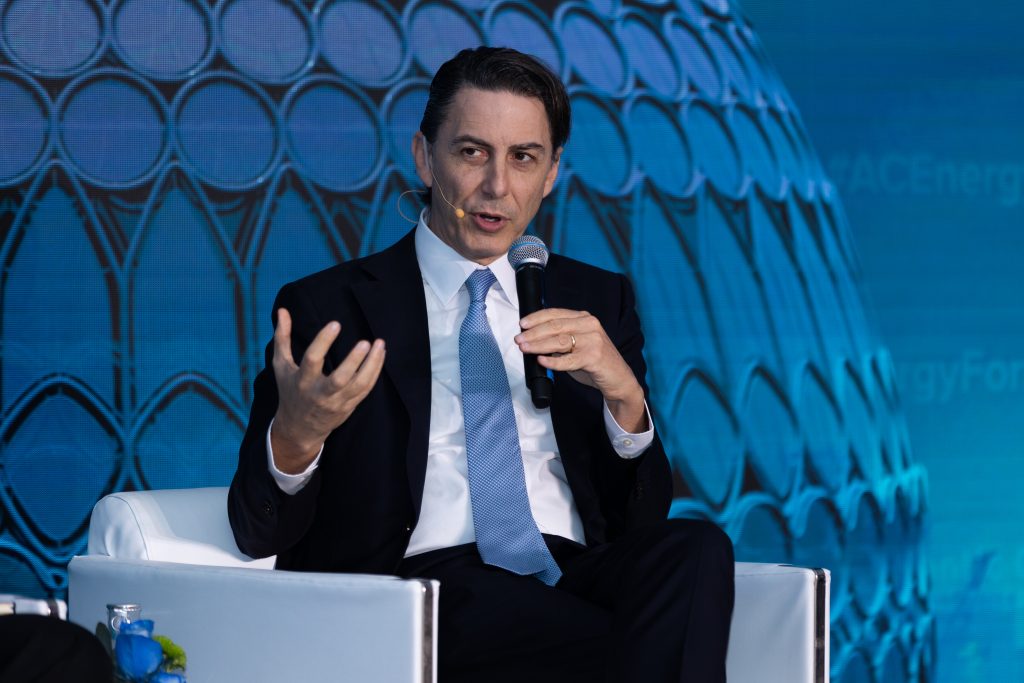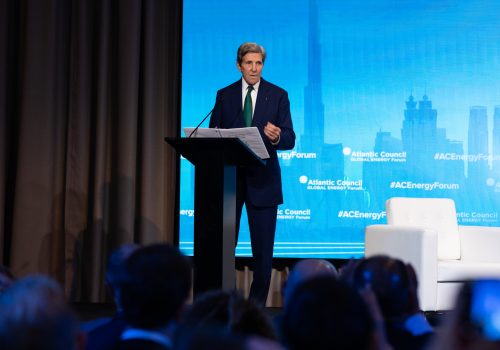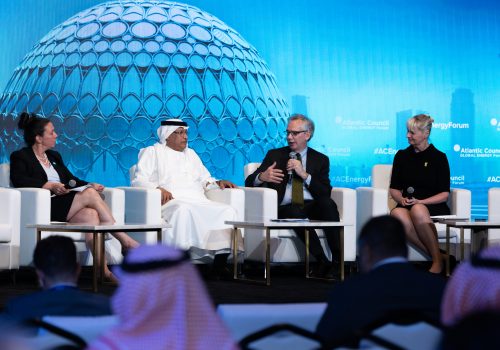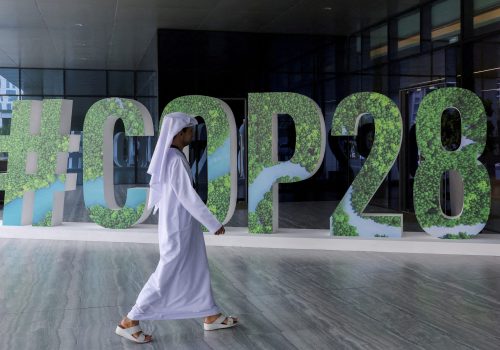Watch the event
Energy security is “not just something we talk about in the context of Russia and Europe on gas,” said Amos Hochstein, senior advisor to the US president for energy and investment, on Thursday. Speaking at the Atlantic Council’s Global Energy Forum in Dubai, he explained that the priority of energy security “has to be the same when it comes to EVs [electric vehicles], lithium, solar panels, and wind turbines.”
Hochstein, who was formerly the US assistant secretary of state for energy resources, discussed the United States’ vision for the future of energy security, the importance of building supply chain resilience as part of the energy transition, and the path forward for regional integration in the Middle East.
Atlantic Council CEO and President Frederick Kempe asked Hochstein whether he thought the United Nations climate change conference known as COP28 in Dubai was divisive or inclusive for its large number of participants, including members of the oil and gas industries. “It’s okay to have disagreements,” Hochstein said. “I don’t think that we should expect that if somebody came here and didn’t agree, then that’s a failure. I think it’s a success that we’re having a conversation.”
“If you really want this to be a net-zero world,” he continued, “you have to bring everybody together.” This approach to climate talks, he said, can convince fossil fuel companies that investing in the energy transition is not “just investing in [their] disruption, but it’s investing in where the future is going to be.”
Below are more highlights from Hochstein’s conversation with Kempe.
Conditions for success
- Hochstein outlined the United States’ goals on energy security: a more equal distribution of investment around the world, building more energy infrastructure, and “narrowing the gap between developed and developing economies on both deployment and viewpoint.”
- Hochstein explained that the Biden administration is taking a new approach to development that prioritizes commercial investment, in projects such as the planned railway line connecting Angola and Tanzania.
- “Development is really important, but it doesn’t replace investment,” Hochstein said, “and that’s what we’ve done wrong.”
The future of energy security
- “The lesson from the dependency on Russia is not: I shouldn’t depend on Russia for all my gas,’” said Hochstein. Rather, he said, “The lesson is: I shouldn’t depend on my energy from a single source.’”
- “The entire supply chain can’t be dominated by one country,” said Hochstein. “Not China, not the United States.” Rather, he said, the supply chain must have a “diversified set of investment into the infrastructure that’s necessary,” for the energy transition, “from mining to processing to manufacturing.”
- “The lesson from the twentieth century is: Build a well-diversified world and economic structure,” he said. “I think we have such an amazing opportunity because we’re building something new.”
- Hochstein said that this lesson applies equally amid the energy transition. There shouldn’t be “a single point of failure in my supply chain,” he said. “That was true on oil, and it is true on gas, and it is now true on renewables, and it’s true on nuclear fuel,” he said.
Middle Eastern integration and security
- Hochstein said that amid the Israel-Hamas war, the administration remains “committed to the goal of regional integration” in the Middle East. “In fact,” he said, “this conflict should be a doubling down on reminding us that if we don’t go towards regional integration, peace, and security, this is the alternative.”
- Hochstein, who mediated the Israel-Lebanon maritime agreement in 2022, highlighted the importance of ensuring long-term security along the two countries’ border. “Hopefully, as we get to the other side of this conflict, we have to look at something that’s viable for the Lebanese state to get stronger,” he said, “to return to economic growth and to have security along the border.”
- From his mediating work in the Middle East, Hochstein said he had learned that “prosperity has to be part of national security.” The more there is “interconnection and integration,” he said, “the more there is codependency” and the more there is to lose when countries walk away from agreements.
Daniel Hojnacki is an assistant editor on the editorial team at the Atlantic Council.
Watch the full event
Further reading
Wed, Dec 6, 2023
John Kerry unveils a ‘critical’ new US strategy to expand fusion energy
New Atlanticist By Katherine Walla
"We need to pull ourselves together with every strength we have,” Kerry said on the first day of the Global Energy Forum.
Wed, Dec 6, 2023
The world’s biggest energy exporters plot out the next steps toward net zero
New Atlanticist By
At the Global Energy Forum, key leaders of the Net-Zero Producers Forum laid out a vision from some of the world’s largest energy exporters for making progress on the world’s sustainability goals.
Thu, Nov 30, 2023
Expert analysis: The successes and shortcomings in the fight against climate change at COP28
New Atlanticist By
Our experts dispatched to Dubai, where they analyzed how global leaders responded to the greatest challenges posed by climate change.
Image: Amos Hochstein, Senior Advisor to the President for Energy and Investment, speaks at the Global Energy Forum in Dubai, December 7, 2023.




